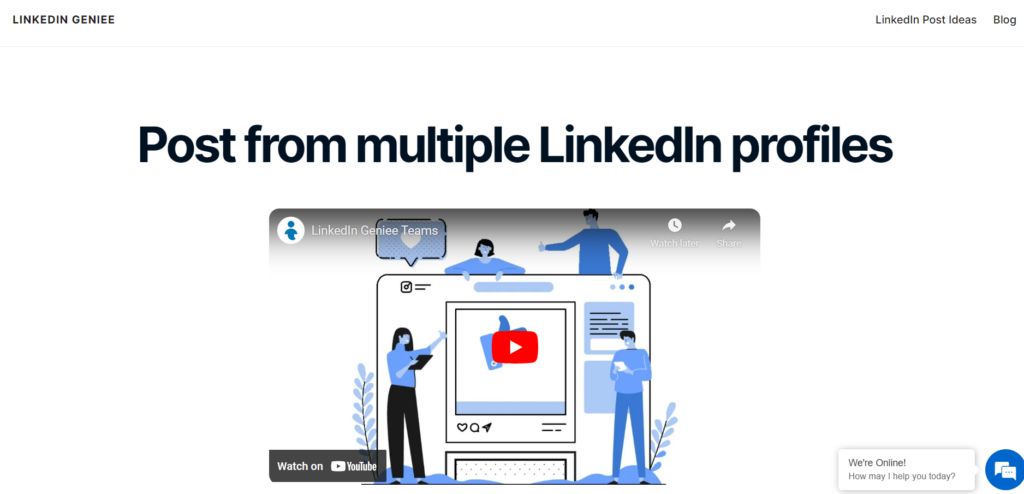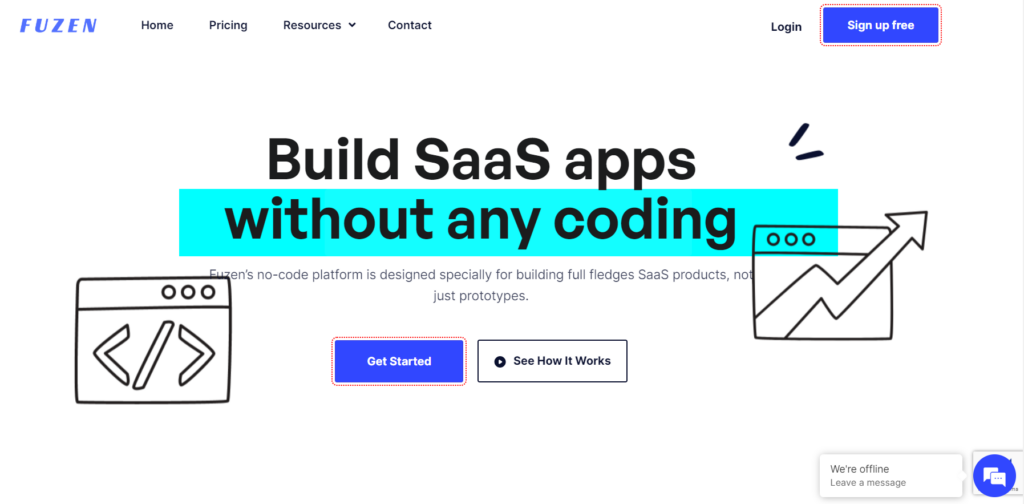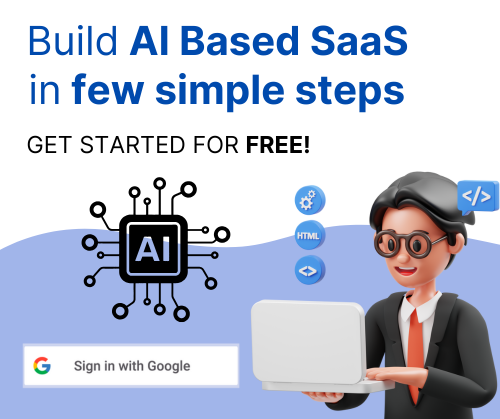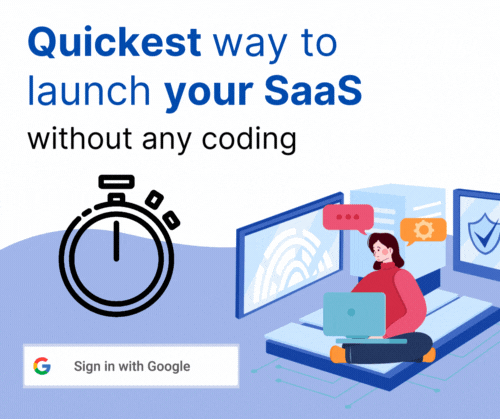Artificial Intelligence (AI) has been the talk of the tech town for quite a while now! With its ability to sort through tons of data and make smart choices, AI is changing lots of things, and modern app builders are making SaaS development accessible to everyone.
In this article, let’s explore the tools to build AI-based SaaS and how no-code AI SaaS builders can help you launch powerful applications without writing a single line of code.
Why this is an exceptional time for AI-based SaaS?
Now is a fantastic time to create AI-based SaaS for a few key reasons.
Key statistics:
More and more SaaS companies are integrating AI within their software solutions. Look at these SaaS products utilizing AI. Research from Omdia suggests that global AI software revenue is projected to skyrocket to $118.6 billion by 2025, jumping from just $9.5 billion in 2018.
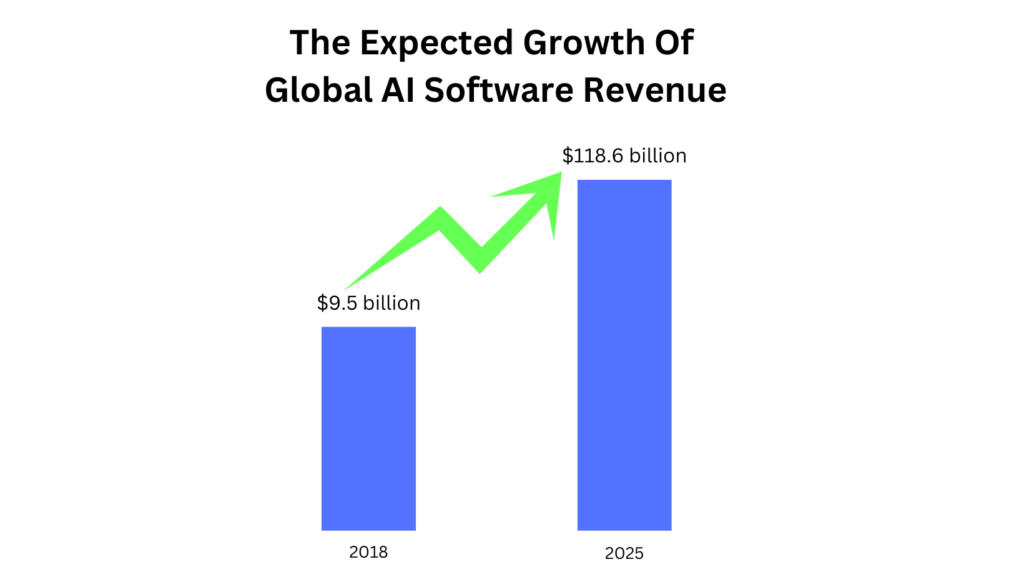
This same report anticipates that AI will become a standard part of almost every new software offering within a couple of years.
A survey by Tech Jury also revealed that 35% of SaaS businesses are already utilizing AI, while an additional 42% have plans to integrate it into their services soon.
Here are some more stats from Cledara that highlights the demand of AI in SaaS.
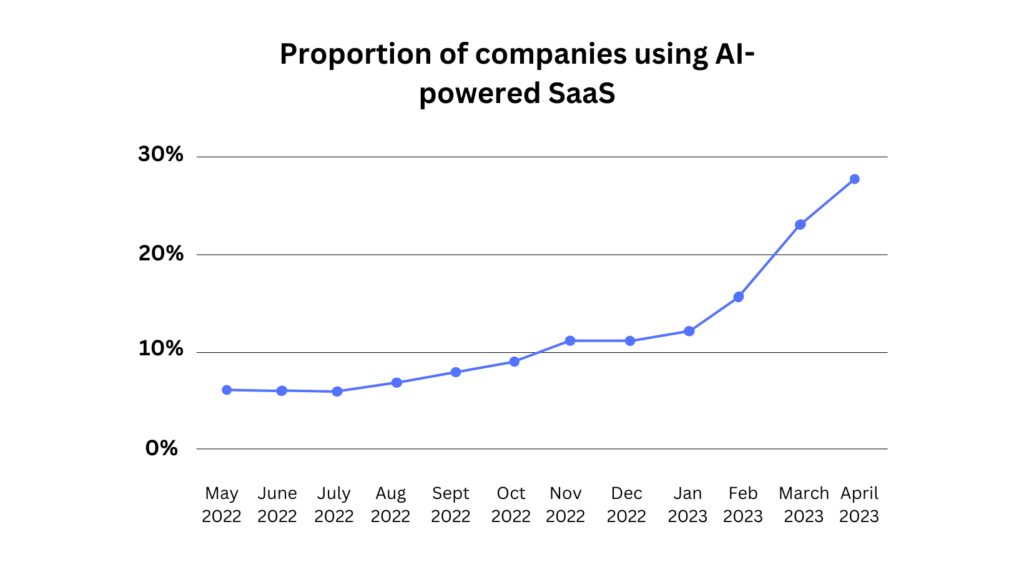
Advancements in AI Technology
Another important reason to consider developing an AI-based SaaS is "Technology advancements". AI is getting smarter day by day making it easier to develop and implement AI solutions.
Businesses are increasingly recognizing the value of AI in streamlining operations and enhancing user experiences. This is why understanding AI Statistics and Trends is vital.
Diverse Application
AI is being integrated into a wide range of SaaS offerings across industries.
From customer relationship management (CRM) tools that use AI for predictive analytics to healthcare SaaS platforms leveraging AI for diagnostics and personalized treatment plans, the applications are diverse and expanding.
Evolving Customer Expectations
Customers increasingly expect SaaS products to offer intelligent features, automation, and data-driven insights.
This demand is pushing SaaS providers to integrate AI capabilities to enhance their offerings and remain competitive in the market.
AI-Powered Automation
AI is being used to automate repetitive tasks, streamline workflows, and improve overall operational efficiency within SaaS products.
This automation reduces manual efforts, enhances productivity, and allows businesses to focus on higher-value tasks.
Data-Driven Insights
AI enables SaaS platforms to process and analyze vast amounts of data to provide actionable insights.
This is particularly valuable in sectors such as marketing, finance, and e-commerce, where data-driven decision-making is critical.
Personalization and User Experience
AI helps SaaS companies personalize user experiences by analyzing user behavior, preferences, and historical data.
This leads to more tailored recommendations, content, and services, thereby improving user satisfaction and retention.
AI-aaS (AI as a Service)
Some companies specialize in offering AI-based services that can be integrated into existing SaaS platforms through APIs.
This allows SaaS providers to access advanced AI functionalities without building them from scratch.
Increased Competition:
The growing importance of AI in SaaS has led to increased competition among providers.
Companies are investing in AI research, acquisitions, and talent to stay ahead in the market, fostering innovation and rapid development of AI-driven features.
Cost-Effective Solutions:
As AI technologies mature, the costs associated with building and maintaining AI-based SaaS products have decreased.
This makes it more feasible for startups and smaller companies to enter the AI space and compete with larger enterprises.
Inspiring Examples of AI-based SaaS
1. LinkedIn Geniee
LinkedIn Geniee is an AI-powered tool designed to streamline content creation and optimize sharing strategies on LinkedIn, empowering users to establish a strong and impactful online presence.
It aims to enhance users' online visibility and effectiveness in leveraging the LinkedIn platform for professional networking and brand building.
2. Scrap.so
Scrap.so redefines data extraction through AI-powered web scraping. By automating the extraction process, it enables businesses to effortlessly gather relevant information from various online sources, saving time and resources.
3. Wondercraft
Wondercraft exemplifies AI's prowess in content generation. Through natural language processing, it crafts compelling narratives and automates content creation, catering to diverse industries with personalized content solutions.
4. Grammarly
Grammarly is an AI-driven writing assistant that helps users improve their writing by offering suggestions for grammar, spelling, and style. It integrates with various platforms, including web browsers and Microsoft Office, to provide real-time editing and feedback.
5. Zendesk Answer Bot
Zendesk's Answer Bot uses natural language processing (NLP) to understand customer queries and provide instant, automated responses. It assists customer support teams by resolving common issues and frequently asked questions without human intervention.
6. HubSpot Marketing Hub
HubSpot's Marketing Hub leverages AI to streamline marketing processes. It includes features like lead scoring, predictive lead analytics, and smart content creation, allowing marketers to optimize their strategies and improve customer engagement.
7. Cognilytica's CognitiveScale
CognitiveScale offers AI-powered industry-specific solutions. For example, in finance, it helps with risk management and fraud detection, while in healthcare, it assists with personalized patient care and medical research.
8. Ahrefs
Ahrefs is a powerful AI SaaS tool used to analyze large sets of data related to website performance, backlinks, and keyword rankings. It helps businesses improve their online visibility and optimize their content strategy.
9. UiPath
UiPath provides a platform for automating repetitive tasks using software robots. Its AI capabilities enable the robots to learn and adapt to changes, making it a valuable AI SaaS tool for businesses looking to enhance efficiency in their processes.
The no-code AI SaaS builder advantage
Cost-effectiveness
No-code AI SaaS builders democratize AI-based SaaS development, eliminating the need to code app features from scratch. This accessibility significantly reduces development costs, enabling startups and SMEs to enter the market with innovative solutions without extensive financial barriers.
Flexibility
With a no-code artificial intelligence SaaS builder, customization becomes intuitive. Businesses can mold AI-based SaaS solutions to suit their specific needs, adjusting functionalities and integrations with ease. When compared to traditional code SaaS platforms, Fuzen removes boilerplate coding so you can focus on logic and design.
Speed
Rapid deployment is the hallmark of no-code artificial intelligence SaaS app development. By leveraging visual interfaces and pre-built modules, developers can swiftly create, test, and launch products, accelerating time-to-market significantly.
Scalability
No-code AI SaaS builders are inherently scalable, allowing seamless expansion as user bases grow or new features are required. This scalability ensures that businesses can adapt and evolve without hindrances.
Building AI-based SaaS with Fuzen - A AI SaaS builder
Fuzen, as a dedicated no-code development platform for building SaaS applications, emphasizes ease of use, customization, and seamless integration, empowering users to create sophisticated AI-based solutions without the barriers of traditional coding complexities.
Certainly, here's an organized presentation:
Features of Fuzen
User-Friendly Interface
Fuzen offers an intuitive drag and drop interface for both web dashboards and mobile applications, ensuring that users of any technical background can navigate the platform seamlessly. The simplified design accelerates the development process and empowers users to focus on creating innovative AI-based SaaS applications.
Customizable Templates
Fuzen provides a rich set of customizable templates tailored specifically for SaaS applications. These templates serve as a foundation, whether you’re building a web dashboard or a mobile app —allowing users to kickstart their projects swiftly. The flexibility to customize templates ensures that each application can be uniquely crafted to meet the specific needs and branding of the user.
Automation
Fuzen's automation features can streamline data workflows, allowing for automated data collection, transformation, and delivery. This facilitates the continuous flow of data required for training and updating AI models.
Scalability and Performance
Fuzen's scalability ensures that as the SaaS product grows and demands more data, the infrastructure can accommodate it. This is vital for AI models that require extensive data for training and fine-tuning.
Reduced Development Time
Fuzen's streamlined data processes and automation can potentially reduce the development time for AI-based features within the SaaS product, accelerating time-to-market.
Integration Capabilities
Fuzen is equipped with robust integration capabilities, enabling seamless connectivity with other tools and services. This facilitates the incorporation of AI functionalities, third-party APIs, and data sources into the SaaS applications.
The platform's integration capabilities contribute to the development of comprehensive and feature-rich solutions.
Benefits of Using Fuzen
Time and Cost Savings
By eliminating the need for extensive coding, Fuzen significantly reduces development time and associated costs. The no-code artificial intelligence SaaS builder empowers users to focus on the application's logic and features rather than spending time on intricate coding tasks. This accelerates the time-to-market for AI-based SaaS applications.
Customization Options
Fuzen's emphasis on customization extends to the core of the development process. Users can tailor the application to their unique requirements without delving into complex coding structures. This level of customization ensures that the resulting SaaS applications align precisely with the user's vision and business objectives.
User-Friendly Interface
The user-friendly nature of Fuzen not only aids in initial development but also contributes to the ease of ongoing maintenance and updates. Users can navigate the platform effortlessly, making modifications, adding features, and ensuring a positive user experience throughout the application's lifecycle.
Scalability and Growth
Fuzen's no-code AI SaaS builder platform is designed with scalability in mind. As your AI-based SaaS application gains traction and user demand increases, the platform accommodates growth seamlessly. Users can scale their applications without the complexity traditionally associated with scaling software solutions, ensuring a smooth transition as business needs evolve.
In Conclusion
The combination of AI (Artificial Intelligence) and SaaS (Software as a Service) offers a unique chance for exciting innovations. No-code AI SaaS builders, like Fuzen, play a crucial role by making it easier for businesses to use AI without dealing with complex coding.
In simpler terms, we now have the ability to create powerful SaaS solutions driven by AI, bringing in a new era of technological empowerment where we can make a big impact with just a few clicks. From smart lead generation tools to predictive analytics platforms, AI SaaS ideas are evolving rapidly — and with tools like Fuzen, turning those ideas into reality has never been more accessible.

